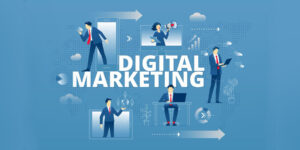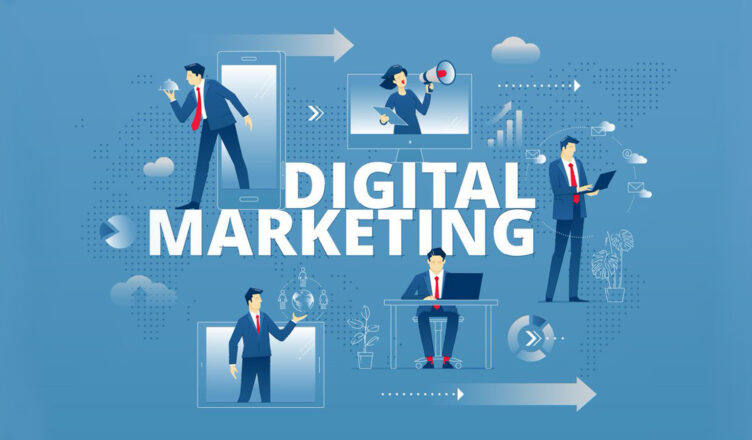Types of Digital Marketing: An In-Depth Guide

Digital marketing has become an essential part of modern business strategy, encompassing a range of tactics and channels designed to reach and engage customers online. Here, we explore the various types of digital marketing, detailing their unique characteristics and benefits.
1. Search Engine Optimization (SEO)
Definition: SEO is the practice of optimizing a website to rank higher in search engine results pages (SERPs) to increase organic (non-paid) traffic.
Key Components:
– On-Page SEO: Involves optimizing individual web pages, including content, meta tags, headings, and internal links.
– Off-Page SEO: Focuses on external factors like backlinks, social signals, and online reputation.
– Technical SEO: Ensures that a website meets the technical requirements of search engines, such as site speed, mobile-friendliness, and crawlability.
Benefits:
– Increases organic visibility and traffic.
– Builds credibility and trust with users.
– Long-term, cost-effective strategy.
2. Content Marketing
Definition: Content marketing involves creating and sharing valuable, relevant, and consistent content to attract and retain a clearly defined audience.
Key Components:
– Blog Posts: Regularly updated articles on a website.
– Infographics: Visual representations of information.
– Videos: Engaging content for platforms like YouTube and social media.
– E-books and Whitepapers: In-depth guides or reports.
Benefits:
– Establishes authority and expertise.
– Engages and educates the audience.
– Drives organic traffic and leads.
3. Social Media Marketing
Definition: Social media marketing uses platforms like Facebook, Instagram, Twitter, LinkedIn, and TikTok to promote products, services, and brands.
Key Components:
– Content Creation: Posts, stories, videos, and live streams.
– Engagement: Interacting with followers through comments, messages, and likes.
– Advertising: Paid promotions and sponsored posts.
Benefits:
– Builds brand awareness and loyalty.
– Provides direct interaction with customers.
– Offers targeted advertising options.
4. Pay-Per-Click (PPC) Advertising
Definition: PPC is an online advertising model where advertisers pay each time a user clicks on one of their ads.
Key Platforms:
– Google Ads: Search and display network.
– Social Media Ads: Facebook, Instagram, LinkedIn, etc.
– Bing Ads: Search engine advertising.
Benefits:
– Immediate visibility and traffic.
– Highly measurable and adjustable.
– Targeted to specific demographics and interests.
5. Email Marketing
Definition: Email marketing involves sending targeted messages to a group of subscribers via email to promote products, services, or content.
Key Components:
– Newsletters: Regular updates and information.
– Promotional Emails: Special offers and discounts.
– Automated Campaigns: Triggered emails based on user actions.
Benefits:
– Direct communication with customers.
– High return on investment (ROI).
– Personalized and segmented messaging.
6. Affiliate Marketing
Definition: Affiliate marketing is a performance-based marketing strategy where businesses reward affiliates for driving traffic or sales through their referral links.
Key Components:
– Affiliates: Individuals or companies that promote products.
– Commission Structure: Payment based on sales or leads.
– Tracking and Reporting: Monitoring affiliate performance.
Benefits:
– Cost-effective with low upfront investment.
– Expands reach through affiliates’ networks.
– Performance-based payouts.
7. Influencer Marketing
Definition: Influencer marketing leverages individuals with a large and engaged following to promote products or services.
Key Components:
– Influencers: Social media personalities, bloggers, or celebrities.
– Collaborations: Sponsored posts, reviews, and giveaways.
– Platforms: Instagram, YouTube, TikTok, and blogs.
Benefits:
– Access to a targeted and engaged audience.
– Builds credibility and trust.
– Generates authentic content.
8. Video Marketing
Definition: Video marketing uses video content to promote and market products, services, or brands.
Key Platforms:
– YouTube: Long-form and educational content.
– Social Media: Short-form videos on platforms like Instagram, TikTok, and Facebook.
– Webinars: Live or recorded educational sessions.
Benefits:
– Highly engaging and shareable.
– Boosts conversion rates.
– Improves SEO with video content.
9. Online PR (Public Relations)
Definition: Online PR involves managing a brand’s online reputation and visibility through digital channels.
Key Components:
– Press Releases: Announcements distributed to online media.
– Influencer Outreach: Building relationships with key online influencers.
– Reputation Management: Monitoring and responding to online reviews and mentions.
Benefits:
– Enhances brand credibility and authority.
– Increases online visibility.
– Manages brand reputation effectively.
10. Mobile Marketing
Definition: Mobile marketing targets users on their mobile devices through various channels, including apps, SMS, and mobile websites.
Key Components:
– SMS Marketing: Promotional messages sent via text.
– App-Based Marketing: In-app advertisements and push notifications.
– Mobile-Optimized Websites: Ensuring websites are user-friendly on mobile devices.
Benefits:
– Reaches users on-the-go.
– Personal and direct communication.
– High engagement rates.
11. Conversational Marketing
Definition: Conversational marketing uses real-time, one-to-one connections between marketers and customers through chatbots, messaging apps, and live chat.
Key Components:
– Chatbots: Automated messaging tools on websites and social media.
– Live Chat: Real-time customer support and engagement.
– Messaging Apps: Platforms like WhatsApp, Facebook Messenger, and WeChat.
Benefits:
– Provides immediate responses and support.
– Enhances customer experience.
– Drives conversions through personalized interactions.
Conclusion
Digital marketing is a multifaceted field that offers numerous strategies for businesses to connect with their audience. By understanding and leveraging these different types of digital marketing, companies can create a comprehensive and effective marketing plan tailored to their specific goals and target audience. Whether through SEO, content marketing, social media, or any other method, digital marketing provides the tools to succeed in the digital age.


